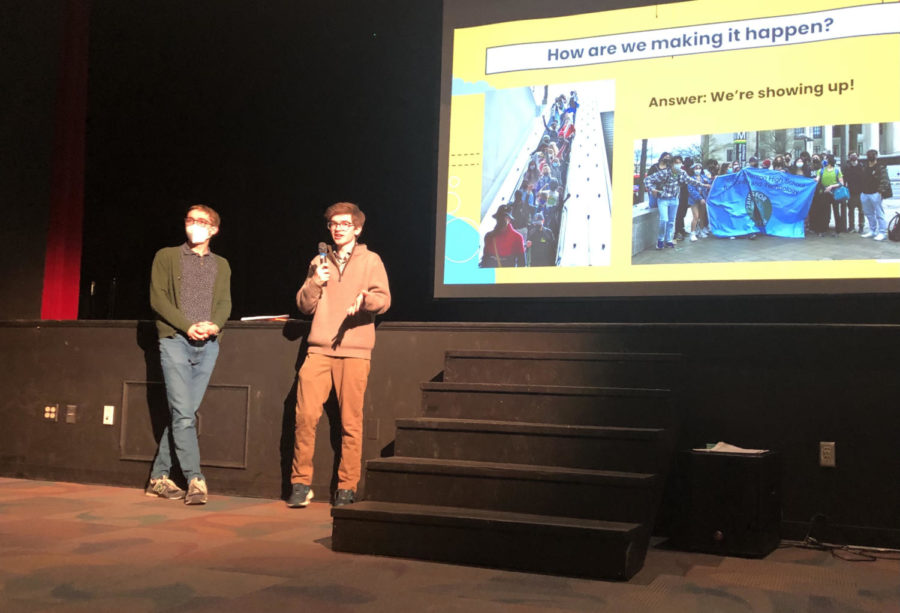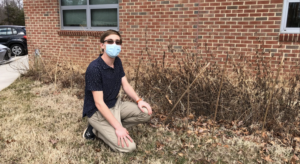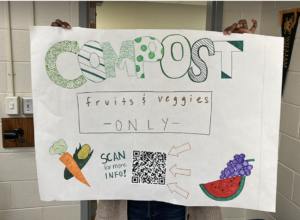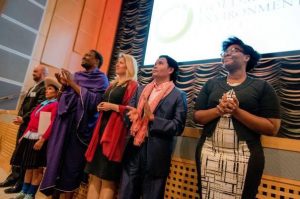Another Friday for the future
Estan Rodriguez (right) and Liam Carey (left) present at an interest meeting for the Fridays For Future strike. “Considering what our attendance was for … our interest meeting last year, this was probably three times that,” Rodriguez said.
February 28, 2023
Last year, senior Liam Carey and senior Estan Rodriguez formed TJ for Future, Jefferson’s extension of the Fridays for Future movement, and organized a climate walkout as part of Fridays for Future’s Global Climate Strike that year on March 25, 2022. This year, they’re doing it again, taking valuable lessons learned from the previous walkout in order to organize this year’s walkout, occurring March 3, 2023, 1:45-4:00 a.m. at Black Lives Matter Plaza, DC.
At an interest meeting for the Fridays For Future, the two seniors shared photos of students participating in the strike, including them walking with banners and signs from the White House to the Capitol, and shared stories of their experience there.
“We were all on the Metro together, we were all crammed in there, it was pretty awesome to just feel that unity,” Rodriguez said. “We filled up a whole Metro car and it was pretty awesome. You got to meet all sorts of new people who are also climate-minded, talk about what they’re doing, what is their take on the climate crisis, and it [was]interesting to see what different people care about as subsets of the same important issue.”
However, Carey and Rodriguez believed that there was significant room for improvement. Previously, TJ for Future used largely impersonal means to get word of the student strike out.
“Last year we went with, ‘Are you interested in this strike?'” Rodriguez said. “If people said yes, you would say, ‘Okay, great, here, you can have this flyer,’ and a lot of the time we lost people after that because we weren’t able to follow them.”
This year, they will use personal outreach to remain in contact with people after they express interest in participating.
“This year, what we’re doing is we have in the [interest] form, ‘My preferred method of contact,’ and Liam and I are committed to contacting people personally about how they’re going to be traveling to the strike,” Rodriguez said. “[We ask] if they’re still going, if they’re going to be attending of the club collaborative events, so we can make it more personal because I think that the climate movement should be personal.”
Unlike last year, the strike on March 3 coincides with a student holiday, which comes with benefits for participation and challenges for transportation.
“[The strike is] on Friday, March 3, which is a day off from school, that’s kind of a blessing and a curse: [students] don’t have to miss class but [they’re] going to have to get into DC and back home without school buses and stuff,” Carey said. “What we’re trying to do is make sure that everyone can get there regardless of whether [they have their own transportation].”
With both new strategies for outreach and the more convenient date, the two seniors are hoping to see even greater success than last year. However, they highlight the need for student liaisons to help expand their outreach.
“A liaison is kind of like a leader in the movement, and we will be working with [them] to spread the word about the strike, and then also getting people involved in putting up fliers,” Rodriguez said. “Another area where we need some help is the socials. So I can manage socials decently well, but it never hurts to get more people involved with that, because researching, making graphic organizers, and posting them at the right time of the day to get the most kind of involvement on the posts and the most comments and things like that, that’s not my area of expertise. Anybody who’s good at that, that’s some help we could definitely use.”
In addition, with their graduations upcoming, Carey and Rodriguez are preparing the movement to be able to last after they’re gone.
“We have two very wonderful people who are very likely to lead this movement in the future. We have a freshman and a sophomore who are both working with us this year. They’re kind of learning the ropes from us so that we can make sure that this movement is in safe hands once we graduate,” Rodriguez said.
As for the strike itself, while it aims to raise general awareness to their cause, trying to create changes to policies is on the minds of the two seniors as they plan the strike. First, the group hopes to encourage climate action at the federal and international levels.
“We are saying, ‘Politicians, we need to meet the Paris Agreement, otherwise, we’re screwed,'” Carey said. “Second, we want Biden to declare a national climate emergency … because that would help us get to the Paris Agreement and make it a priority goal, so that’s more concrete, because it’s something we can say, ‘that’s how we do it.'”
However, the group has concerns about policy at the state level as well.
“Youngkin is trying to pull [Virginia] out of the [Regional Greenhouse Gas Initiative], which actually was a really good program because it … decreased carbon emissions, but it also increased industry, because of the way that the carbon buyback system works,” Rodriguez said. “The fact that our governor can’t see that is very disappointing, and we want to make that change.”
Additionally, the group aims to gain media attention, particularly from national media.
“On a smaller [scale], something we can almost be sure of happening, is we want to get media coverage for the strike. That happens pretty much every year, but we kind of want to get out of the realm of local news and maybe we can hit some headlines on major news sources,” Rodriguez said.
For those who are not able to make it to the protest, Carey, who works directly with Fridays For Future DC, said that another opportunity is coming up to participate.
“There’s a secret that we haven’t told anyone yet, but there’s another strike going on April 20, on Earth Day, that’s gonna be a lot bigger,” Carey said. “That’s when we might get national press.”
No matter which strikes or events students attend to support the climate movement, Carey said that any form of engagement is helpful, as it increases awareness of the issue and political participation to stop climate change.
” If someone goes to a protest,they’re much more likely to be politically engaged in other ways [in the future].Even going to a banner making event and creating a banner that says, like, ‘Stop climate change,’ or something like that [helps increase political engagement],” Carey said. “Any ways people can get active are helpful because it’ll increase voter turnout and everything in the future. Making people think about the crisis is what we need to do.”










